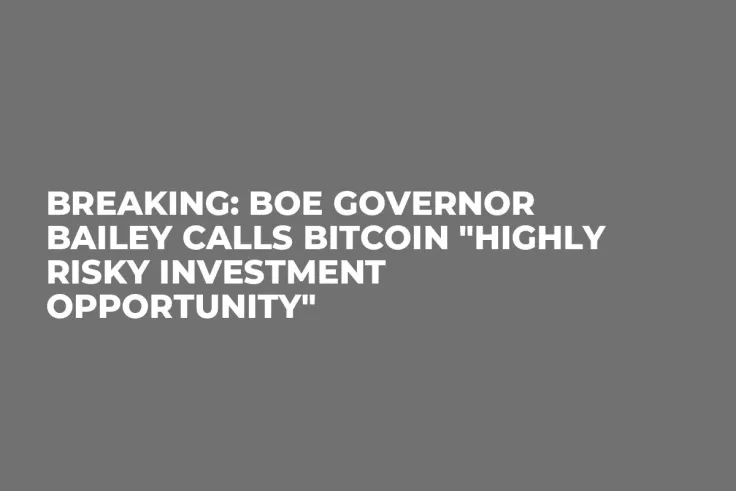
In a stablecoin-focused speech delivered today at a virtual Brookings Institution event, Bank of England governor Andrew Bailey ramped up his criticism of Bitcoin, claiming that it has no connection to money.
I will start with crypto-assets, such as bitcoin, which have appeared in the last ten years or so. They have no connection at all to money.
Bailey adds that cryptocurrencies such as Bitcoin "may have" extrinsic value but they are a "highly risky" investment opportunity.
As reported by U.Today, Bailey warned investors earlier this year that Bitcoin investors could lose all their money since he is convinced that the top crypto has no intrinsic value, echoing his earlier comments as CEO of the Financial Conduct Authority (FCA) back in December 2017.
He also noted that cryptocurrency assets are unusable for payments, while praising stablecoins:
Stablecoins could offer some useful benefits. For example, they could further reduce frictions in payments, by potentially increasing the speed and lowering the cost of payments (particularly if global stablecoins were to be established). Stablecoins may offer increased convenience, including via integration with other technology, such as social media platforms or retail services.
However, the governor slammed those fiat-pegged digital assets that are issued outside of the banking system since some do not include a legal claim for holders and may incur liquidity risks:
Stablecoins need to offer coin-holders a robust claim, with supporting mechanisms and protections to ensure they can be redeemed at any time 1-to-1 into fiat currency.
Tether, the top stablecoin with a market cap of $13 bln, sent shockwaves across the market last year by revealing that only 74 percent of USDT was backed by cash or cash equivalents last year.
In addition, Bailey argued against issuing a multi-currency stablecoin, which was the first iteration of Facebook's Libra, saying that they should initially be based on single fiat currencies:
The starting point for a global stablecoin should be based on single currencies. We should not run before we can walk.
He emphasized the need for global regulatory standards for the nascent asset class:
In particular, host regulators of global stablecoins must, and are, working with other regulators in other jurisdictions to ensure that they are appropriately regulated and gaps in coverage, opportunities for regulatory arbitrage, do not emerge.
While BoE is mulling over creating its own central bank digital currency, Bailey is not ruling out the possibility that CBDCs could coexist with stablecoins:
Stablecoins and CBDC are not necessarily mutually exclusive. Depending on design choices, they could sit alongside each other, either as distinct payment options, or with elements of the stablecoin ecosystem, such as wallets, providing consumers with access to a CBDC.

 Vladislav Sopov
Vladislav Sopov Dan Burgin
Dan Burgin